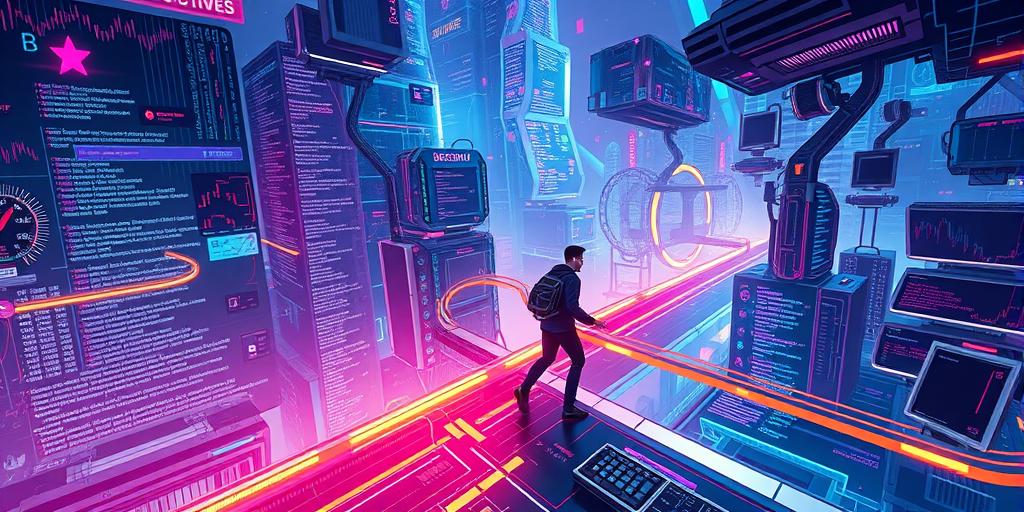Is the relentless pace of technological advancements leaving developers in the dust? Are we hurtling towards a future where the skills needed today are obsolete tomorrow? The tech industry is notorious for its breakneck speed, but the question isn’t just about keeping up; it’s about whether the current system is sustainable for the developers who are the engines of innovation. This article dives deep into the challenges developers face and explores the potential consequences of this ever-accelerating technological landscape.
The Ever-Shifting Sands of Technology
The tech world is in a perpetual state of flux. New frameworks, languages, and tools emerge almost daily. What was cutting-edge yesterday might be considered legacy today. This rapid evolution creates a daunting challenge for developers, forcing them into a continuous learning cycle. The pressure to stay relevant and competitive is immense, and the sheer volume of new information can feel overwhelming, leading to “developer burnout” and ultimately potentially affecting the quality of applications produced.
The Skills Gap Widens
The rapid pace of change exacerbates the existing skills gap in the tech industry. Companies struggle to find developers with the specific skills required for the latest technologies, while developers struggle to keep their skill sets updated. This creates a vicious cycle, where companies are forced to compromise on quality or hire less experienced developers, and developers face the constant pressure to retrain and upskill. This skills gap is further magnified by a lack of structured training and resources for developers to quickly learn and adapt to these new technologies.
The Impact on Developer Wellbeing
The constant pressure to learn and adapt takes a toll on developers’ mental and physical wellbeing. The fear of obsolescence, the long hours, and the intense competition contribute to high levels of stress and burnout. This ultimately impacts productivity and potentially compromises the quality of software produced.
Strategies for Developers to Stay Ahead
While the challenges are significant, developers are not powerless. Several strategies can help them navigate the rapid pace of change and thrive in this dynamic environment. Staying ahead of the technological curve requires a proactive and adaptive approach.
Continuous Learning and Adaptation
Continuous learning should be considered not as an optional extra, but as a crucial part of a developer’s career. Engaging in regular upskilling and reskilling activities, including online courses, workshops, and conferences, is essential to stay current with the latest industry trends. The key is to identify and prioritize the skills that are most in demand and align with one’s career goals and this should not be a passive undertaking.
Building a Strong Foundation
While learning new technologies is important, developers should also focus on building a strong foundation in fundamental computer science principles. A solid understanding of data structures, algorithms, and software design patterns will serve them well regardless of the specific technologies they use. This foundational knowledge provides a solid base to adapt and learn new technologies more efficiently.
Networking and Collaboration
Networking and collaboration with other developers are crucial for staying informed about new trends and best practices. Attending industry events, participating in online forums, and engaging with other developers online can provide valuable insights and opportunities to learn from others’ experiences. Collaboration can also help mitigate feelings of isolation and stress often associated with keeping up in this industry.
The Future of Development in a Rapidly Changing World
The tech industry’s rapid pace is unlikely to slow down anytime soon. The only certainty is constant change. However, by embracing continuous learning, building strong foundations, and actively engaging with the community, developers can not only keep up but also thrive in this dynamic and rewarding field. This will require a fundamental shift in educational approaches and a change in mindset for developers themselves.
Adapting Educational Curricula
Educational institutions must adapt their curricula to reflect the ever-changing demands of the tech industry. They need to emphasize fundamental principles while incorporating the latest technologies. This will require a greater emphasis on project-based learning and practical skills, helping equip developers to deal with this rapidly changing landscape.
Embracing Lifelong Learning
Developers should embrace lifelong learning as a core principle of their careers. Continuous upskilling and reskilling are not just about keeping up; they are about staying ahead and seizing new opportunities. This involves proactively identifying and seeking out new learning opportunities and actively engaging in professional development.
Embrace the challenge, adapt and learn, and you will not only survive but flourish in this exciting era of technological advancement! The future is fast, but developers who learn to navigate this ever-changing landscape will undoubtedly succeed.
Are you ready to ride the wave? Let us know your thoughts in the comments below!




